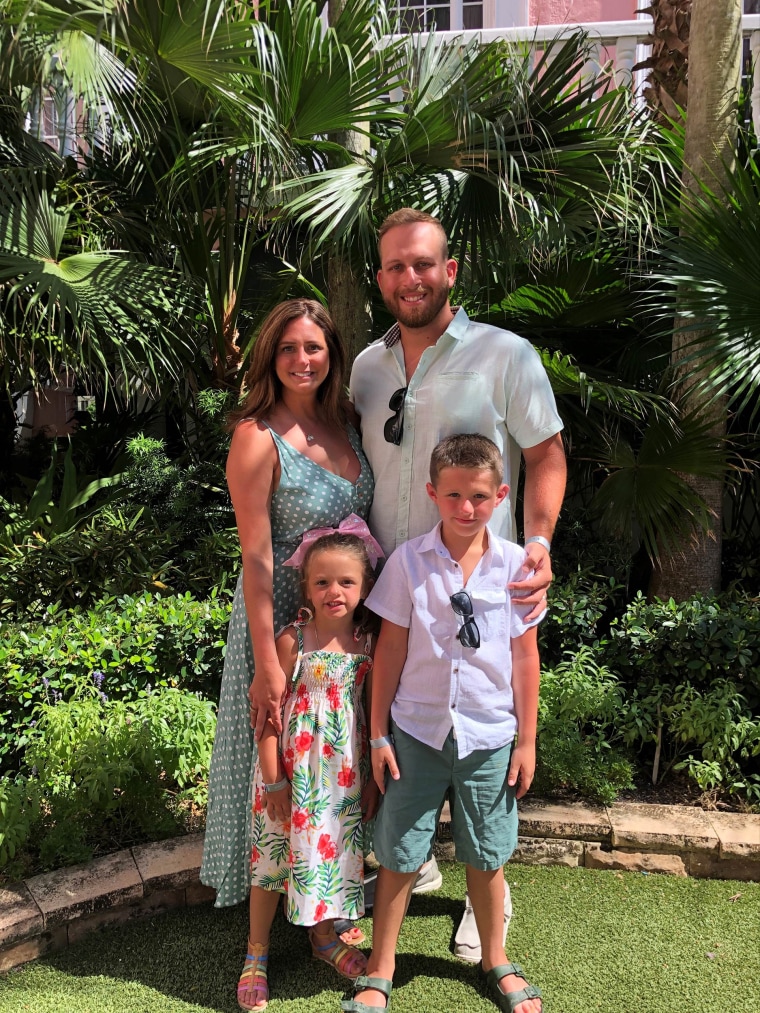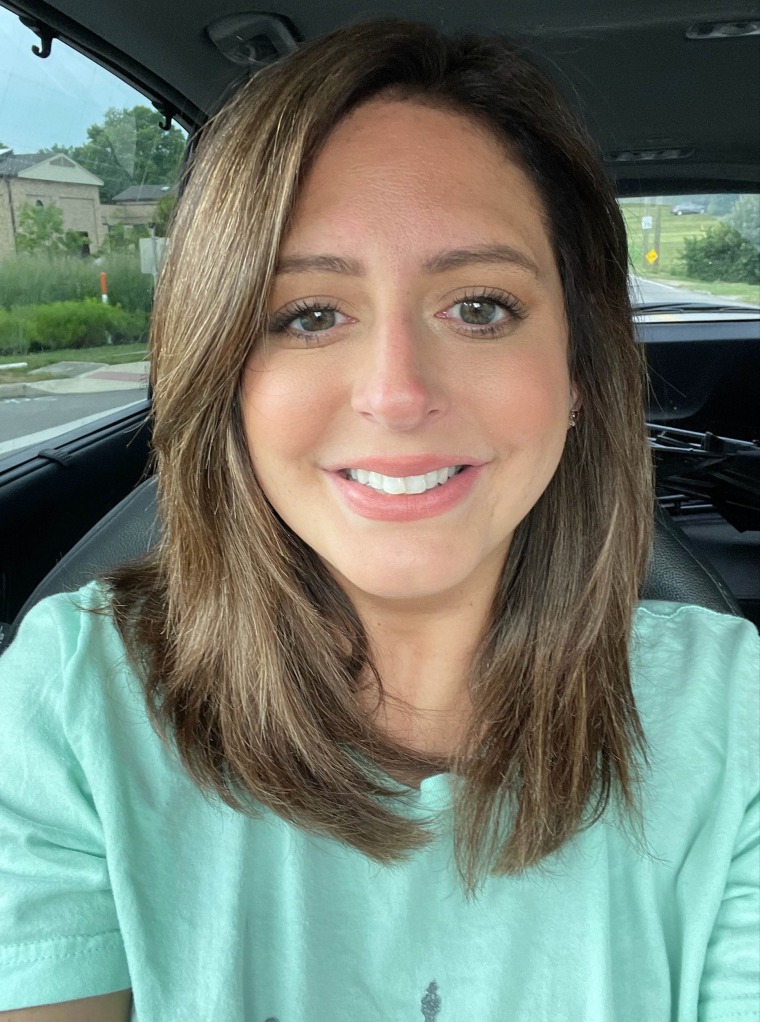When Amy Beitz was seven months pregnant with her second child, she experienced pain while urinating. At first doctors thought she had a urinary tract infection. But when antibiotics failed to clear it, her doctor performed an exam and found something surprising.
“She felt it and was like, ‘You have a tumor,’” Beitz, 33, of Cincinnati, Ohio, told TODAY. “It was really scary. I was petrified.”

Beitz learned she had a desmoid tumor, a rare type of benign soft tissue mass. While they aren’t cancerous, they can dramatically impact one’s life, causing pain and other issues, such as infertility in Beitz’s case.
“It is so devastating to my body and my life and my family’s life,” she said. “I just want to help somebody else who’s going through what I’ve gone through.”
Painful pregnancy symptoms
It was 2016 when Beitz was pregnant with her second child and her doctor found something unusual during her exam.
“When I went to see (an oncologist), she was like ‘I’ve never felt anything like this before.’ And then the OB-GYN said the same thing. They were like, ‘This is not something we’ve felt or seen before,’” she said. “When I saw the oncologist she was like, ‘This feels like cement.’ She said, ‘This is so hard and so smooth.’”
The biopsy first said the mass contained “nerve bundles” but a follow-up several months later revealed what it was: a desmoid-type fibromatosis.
“When we saw it came back as a benign tumor that was a really exciting thing,” Beitz said. “What I didn’t realize was how intrusive it was.”
Her tumor pushed against her ureters, kidneys and “overtook a whole bunch of muscles.”
“They explained it as a bunch of golf balls put together but then it had a whole bunch of fingers off of it that were wrapping around the muscles and going up to ureter and against my bladder," she said. "They had to scrape that all off.”

It caused her right ovary and fallopian tube to “disintegrate.” When doctors removed it, they could not get all of the tumor. Doctors tried a variety of chemotherapeutic drugs to shrink it. Each had varying success. She’s currently on a combination of chemotherapy and a medication that puts her in menopause to help manage her pain.
“I have the worst shooting pains where I physically cannot do anything. It’s like every 30 seconds I have these really bad nerve pains that send jolts through my body and also I have the mass pain itself, which sometimes is throbbing,” she said. “I always know when it’s active because it’s got this burning, itching sensation and throbs.”
Desmoid tumors
While desmoid tumors are rare, they can still impact a person’s health dramatically.
“A desmoid tumor is not a full-blown cancer,” Dr. Breelyn Wilky, a medical oncologist at the University of Colorado Medicine who studies soft tissue and bone cancers, told TODAY. “Only about 3 to 5 patients are diagnosed per million as best as we can tell. The common types of desmoids we see either come from people that have had a surgery or had an injury.”
The tumors form when scar tissue cells, called fibroblasts, continue growing after the injury has healed.
“It can sometimes happen without an injury or it can happen when there’s an inappropriate response to the injury and it doesn’t turn off. So you get this overgrown scar tissue that ultimately forms a tumor,” Wilky, who did not treat Beitz, said. “It can literally be anywhere head to toe — wherever these fibroblasts just decide to switch on.”
Desmoid tumors are unlike cancer because they do not spread. But they can be extremely disruptive.
“They can grow a very large, annoying, painful mass that can interfere with normal function particularly of the surrounding structures of the body where it happens to be,” Wilky said.
People who are at greater risk include:
- People with an injury or who have had surgery.
- Pregnant people.
- People with familial adenomatous polyposis.
“Pregnant women are at higher risk for forming desmoid tumors and we don’t completely understand why,” Wilky said. “Some of it is related to the estrogen exposure in pregnancy. But obviously not every woman gets a desmoid when she’s pregnant. So it’s not completely understood.”
Treatment varies for the tumors. Wilky said 20% of them will get smaller and some even disappear.
“For pregnancy you’d think that once the baby’s delivered that the estrogen is down and the tumor might go away. It turns out that most of these patients do actually require some type of treatment,” she explained. “Once the treatment is done, they have a very good outcome, meaning the desmoid doesn’t typically regrow back as aggressively.”
While surgery removes the mass, it can also spark growth.
“There are very high (odds) of desmoid tumors coming back after surgery — as high as 40% to 50%,” Wilky said. “We largely don’t jump into surgery anymore.”
While chemotherapy can shrink some of them, targeted treatments for cancer often work better and have fewer side effects. People who have hormone-fueled tumors might take estrogen blockers.
“Some patients really don’t have many symptoms but there’s the psychological anxiety of knowing that there’s something in their body that’s foreign,” she said. “There can be a tremendous amount of pain and dysfunction.”
Life with a desmoid tumor
Not being able to have another baby was tough for Beitz. But she recently found a surrogate to carry her embryo and she's expecting her third child.
“It took me four years to even come to terms with that and the pain management,” she said. “Living with pain every day is difficult. It’s difficult for my kids to watch.”
Beitz hopes to raise awareness to encourage research into treatments and help others understand them.
“It’s an unknown thing in your body that can take over and wreak havoc,” she said. “I wish it were taken more seriously. It’s just such a rare tumor. If they would, so many people’s lives, including mine, would be easier.”